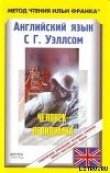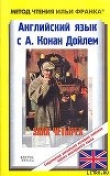
Текст книги "Английский язык с Агатой Кристи. Убийства по алфавиту"
Автор книги: Илья Франк
Соавторы: Agatha Christie,Евгения Мерзлякова
Жанры:
Языкознание
,сообщить о нарушении
Текущая страница: 10 (всего у книги 39 страниц) [доступный отрывок для чтения: 14 страниц]
"But this is horrible!"
"Yes, it is horrible."
"We're up against a homicidal maniac."
"Yes."
His quietness was more impressive (его спокойствие было более впечатляющим; quiet – спокойный) than any heroics could have been (чем мог бы быть любой героизм). I handed back the letter with a shudder (содрогнувшись, я протянул письмо назад: «я протянул письмо назад с содроганием»).
The following morning saw us at a conference of powers (следующее утро застало нас на совещании с властями; conference – собрание, конференция, встреча; power – сила, мощь; могущество). The Chief Constable of Sussex[15]15
Sussex – Суссекс, Сассекс (графство в Великобритании, Англия; теперь разделено на Восточный и Западный Суссекс, East Sussex, West Sussex).
[Закрыть](начальник полиции Суссекса), the Assistant Commissioner of the C.I.D. (заместитель комиссара Управления уголовных расследований), Inspector Glen from Andover (инспектор Глен из Эндовера), Superintendent Carter of the Sussex police (старший офицер полиции Картер из суссекской полиции), Japp (Джепп) and a younger inspector called Crome (и молодой инспектор по имени Кроум: «называемый Кроум»), and Dr. Thompson (и доктор Томпсон), the famous alienist (знаменитый психиатр; alien – внешний; чужеземный; пришлый; инопланетный), were all assembled together (все были собраны вместе). The postmark on this letter was Hampstead (штемпель на письме был из Гэмпстеда), but in Poirot's opinion (но, по мнению Пуаро) little importance could be attached to this fact (этому факту следовало уделять мало внимания; to attach – прикреплять).
heroics [hɪˈrǝʋɪks], power [paʋǝ], alienist [ˈeɪljǝnɪst]
His quietness was more impressive than any heroics could have been. I handed back the letter with a shudder.
The following morning saw us at a conference of powers. The Chief Constable of Sussex, the Assistant Commissioner of the C.I.D., Inspector Glen from Andover, Superintendent Carter of the Sussex police, Japp and a younger inspector called Crome, and Dr. Thompson, the famous alienist, were all assembled together. The postmark on this letter was Hampstead, but in Poirot's opinion little importance could be attached to this fact.
The matter was discussed fully (дело обсуждалось досконально: «полно»). Dr. Thompson was a pleasant middle-aged man (доктор Томпсон был приятным мужчиной средних лет) who (который), in spite of his learning (несмотря на свое образование), contented himself with homely language (довольствовался простым языком; homely – простой, обычный; домашний; уютный), avoiding the technicalities of his profession (избегая специальной терминологии своей профессии).
"There's no doubt," said the Assistant Commissioner (без сомнения, – сказал заместитель комиссара), "that the two letters are in the same hand (что два письма /написаны/ той же рукой). Both were written by the same person (оба /письма/ написаны тем же человеком)."
"And we can fairly assume (и мы можем точно заключить) that that person was responsible for the Andover murder (что этот человек был ответственен за эндоверское убийство; to be responsible for)."
"Quite (вполне). We've now got definite warning of a second crime (теперь у нас точное предупреждение о втором преступлении; to warn – предостерегать) scheduled to take place on the 25th (запланированное на двадцать пятое: «запланированное иметь место двадцать пятого») – tomorrow (завтра) – at Bexhill – (в Бексхилле). What steps can be taken (какие шаги могут быть предприняты)?"
The Sussex Chief Constable looked at his superintendent (начальник полиции Суссекса посмотрел на своего старшего офицера). "Well, Carter (так, Картер), what about it (что насчет этого: «что об этом»)?"
technicality [ˌteknɪˈkælɪtɪ], schedule [ˈʃedju:l] [ˈskedju:l], superintendent [ˌsju(:)pǝrɪnˈtendǝnt]
The matter was discussed fully. Dr. Thompson was a pleasant middle-aged man who, in spite of his learning, contented himself with homely language, avoiding the technicalities of his profession.
"There's no doubt," said the Assistant Commissioner, "that the two letters are in the same hand. Both were written by the same person."
"And we can fairly assume that that person was responsible for the Andover murder."
"Quite. We've now got definite warning of a second crime scheduled to take place on the 25th – tomorrow – at Bexhill. What steps can be taken?"
The Sussex Chief Constable looked at his superintendent. "Well, Carter, what about it?"
The superintendent shook his head gravely (старший офицер серьезно покачал головой). "It's difficult, sir (это сложно, сэр). There's not the least clue towards whom the victim may he (там нет ни единого: «ни малейшего» ключа к тому, кто может быть жертвой). Speaking fair and square (честно говоря: «говоря честно и прямо»; square – квадратный; правильный, ровный, точный; прямой, честный), what steps can we take (какие шаги мы можем предпринять)?"
"A suggestion," murmured Poirot (предложение, – пробормотал Пуаро).
Their faces turned to him (их лица повернулись к нему).
"I think it possible (я думаю, это возможно) that the surname of the intended victim will begin with the letter B (что фамилия предполагаемой жертвы будет начинаться на букву «би»)."
"That would be something," said the superintendent doubtfully (это было бы что-то, – сказал старший офицер с сомнением).
"An alphabetical complex," said Dr. Thompson thoughtfully (алфавитный подход: «принцип алфавита», – сказал доктор Томпсон задумчиво; alphabet).
victim [ˈvɪktɪm], surname [ˈsǝ:neɪm], alphabetical [ˌælfǝˈbetɪk(ǝ)l]
The superintendent shook his head gravely. «It's difficult, sir. There's not the least clue towards whom the victim may he. Speaking fair and square, what steps can we take?»
"A suggestion," murmured Poirot.
Their faces turned to him.
"I think it possible that the surname of the intended victim will begin with the letter B."
"That would be something," said the superintendent doubtfully.
"An alphabetical complex," said Dr. Thompson thoughtfully.
"I suggest it as a possibility (я предлагаю это как возможность) – no more (не более). It came into my mind (это пришло ко мне в голову) when I saw the name Ascher (когда я увидел имя Эшер) clearly written over the shop door of the unfortunate woman (четко написанное над дверьми магазина несчастной женщины; fortune – счастье) who was murdered last month (которая была убита в прошлом месяце). When I got the letter naming Bexhill (когда я получил письмо, называющее Бексхилл) it occurred to me as a possibility (мне пришло /на ум/ как возможность) that the victim as well as the place might be selected by an alphabetical system (что имя жертвы, так же как и место /преступления/, могли быть выбраны по алфавитной системе)."
"It's possible," said the doctor (это возможно). "On the other hand (с другой стороны), it may be that the name Ascher was a coincidence (может быть так, что имя Эшер было совпадением) – that the victim this time (что жертва в этот раз), no matter what her name is (неважно, как ее имя), will again be an old woman who keeps a shop (снова будет старая женщина, которая держит магазин). We're dealing (мы имеем дело), remember (помните), with a madman (с сумасшедшим). So far he hasn't given us any clue as to motive (пока он не дал нам никакой зацепки в качестве мотива; clue – улика; подсказка; нить рассуждения)."
"Has a madman any motive, sir?" asked the superintendent sceptically (есть ли у сумасшедшего какой-нибудь мотив? – скептически спросил старший офицер).
unfortunate [ʌnˈfɔ:tʃnɪt], coincidence [kǝʋˈɪnsɪd(ǝ)ns], motive [ˈmǝʋtɪv]
«I suggest it as a possibility – no more. It came into my mind when I saw the name Ascher clearly written over the shop door of the unfortunate woman who was murdered last month. When I got the letter naming Bexhill it occurred to me as a possibility that the victim as well as the place might be selected by an alphabetical system.»
"It's possible," said the doctor. "On the other hand, it may be that the name Ascher was a coincidence – that the victim this time, no matter what her name is, will again be an old woman who keeps a shop. We're dealing, remember, with a madman. So far he hasn't given us any clue as to motive."
"Has a madman any motive, sir?" asked the superintendent skeptically.
"Of course he has (конечно, у него есть /мотив/), man (человек = послушайте). A deadly logic is one of the special characteristics of acute mania (неумолимая логика является одной из особых характеристик острого маниакального синдрома). A man may believe himself divinely appointed to kill clergymen (человек, возможно, верит, что он божественно назначен убивать священников; divine – божественный) – or doctors (или докторов) – or old women in tobacco shops (или старух в табачных магазинах) – and there's always some perfectly coherent reason behind it (и там всегда будет некая совершенно логичная причина за этим; coherent – сцепленный, связанный; связный, логически последовательный). We mustn't let the alphabetical business run away with us (мы не должны позволять алфавитному делу уводить нас /в сторону/; to run away with). Bexhill succeeding to Andover may be a mere coincidence (Бексхилл, следующий за Эндовером, может быть просто совпадением)."
"We can at least take certain precautions, Carter (мы можем, по крайней мере, предпринять определенные предосторожности, Картер; caution – осторожность), and make a special note of the B's (и сделать специальную запись /всех на букву/ «би»), especially small shopkeepers (особенно владельцев маленьких магазинов), and keep a watch on all small tobacconists and newsagents (и приглядывать за мелкими торговцами табаком и газетными киосками; to keep a watch – приглядывать, следить) looked after by a single person (за которыми следит некий одинокий человек). I don't think (я не думаю) there's anything more we can do than that (что мы можем сделать что-то большее: «там есть что-то больше, чем это, что мы можем сделать»). Naturally keep tabs on all strangers as far as possible (естественно, отслеживать всех незнакомцев насколько это возможно; to keep tabs on – вести учет; отслеживать; tab – этикетка, ярлык; учет)."
acute mania [ǝˈkju:t ˈmeɪnɪǝ], coherent [kǝʋˈhɪǝr(ǝ)nt], precaution [prɪˈkɔ:ʃ(ǝ)n]
«Of course he has, man. A deadly logic is one of the special characteristics of acute mania. A man may believe himself divinely appointed to kill clergymen – or doctors – or old women in tobacco shops – and there's always some perfectly coherent reason behind it. We mustn't let the alphabetical business run away with us. Bexhill succeeding to Andover may be a mere coincidence.»
"We can at least take certain precautions, Carter, and make a special note of the B's, especially small shopkeepers, and keep a watch on all small tobacconists and newsagents looked after by a single person. I don't think there's anything more we can do than that. Naturally keep tabs on all strangers as far as possible."
«We must do what we can,» the Chief Constable said sharply (мы должны сделать, что мы сможем, – резко сказал начальник полиции).
Inspector Glen spoke in his turn (в свою очередь высказался инспектор Глен).
"I'll have a watch kept on anyone (я буду присматривать за любым) connected with the Ascher business (связанным с эшерским делом). Those two witnesses (за теми двумя свидетелями), Partridge and Riddell (Партриджем и Ридделом), and of course on Ascher himself (и конечно, за самим Эшером). If they show any signs of leaving Andover (если они проявят признаки /того, что они/ уезжают из Эндовера; to show – показывать; sign – знак) they'll be followed (за ними будут следить)."
The superintendent uttered a groan (старший офицер издал стон). "With the schools breaking up (с заканчивающимися занятиями; school – школа; учеба; to break up – заканчиваться; закрываться на каникулы) and the holidays beginning (и начинающимися каникулами)? People are fairly flooding into the place this week (люди просто наводнят это место на этой неделе; to flood – наводнять; flood – поток; наводнение)."
sign [saɪn], groan [ɡrǝʋn], flood [flʌd]
The superintendent uttered a groan. «With the schools breaking up and the holidays beginning? People are fairly flooding into the place this week.»
"We must do what we can," the Chief Constable said sharply.
Inspector Glen spoke in his turn.
"I'll have a watch kept on anyone connected with the Ascher business. Those two witnesses, Partridge and Riddell, and of course on Ascher himself. If they show any signs of leaving Andover they'll be followed."
The conference broke up after a few more suggestions (совещание закончилась после еще нескольких предложений) and a little desultory conversation (и недолгого бессвязного разговора).
"Poirot," I said as we walked along by the river (пока мы шли вдоль реки), "surely this crime can be prevented (это преступление, конечно же, может быть предотвращено)?"
He turned a haggard face to me (он повернул ко мне свое изможденное лицо). "The sanity of a city (рассудок города) full of men (полного людей) against the insanity of one (против невменяемости одного /человека/)? I fear, Hastings (я боюсь, Гастингс) – I very much fear (я очень сильно боюсь). Remember the long-continued successes of Jack the Ripper[16]16
Jack the Ripper – Джек Потрошитель (неизвестный лондонский преступник, совершивший ряд зверских убийств женщин в 1888 г.).
[Закрыть](помните, как долго длились успехи: «долго продолжавшиеся успехи» Джека Потрошителя; to rip – разрезать, распарывать)."
"It's horrible," I said (это ужасно).
"Madness, Hastings (сумасшествие, Гастингс), is a terrible thing (это ужасная вещь). I am afraid (я боюсь) … I am very much afraid (я очень сильно боюсь)."
desultory [ˈdes(ǝ)lt(ǝ)rɪ], haggard [ˈhæɡǝd], success [s(ǝ)kˈses]
The conference broke up after a few more suggestions and a little desultory conversation.
"Poirot," I said as we walked along by the river, "surely this crime can be prevented?"
He turned a haggard face to me. "The sanity of a city full of men against the insanity of one? I fear, Hastings – I very much fear. Remember the long-continued successes of Jack the Ripper."
"It's horrible," I said.
"Madness, Hastings, is a terrible thing. I am afraid … I am very much afraid."
IX. The Bexhill-on-Sea Murder
(убийца /из/ Бекхилла-на-Си)
I still remember my awakening on the morning of the 25th of July (я все еще помню мое пробуждение утром двадцать пятого июля; to awake). It must have been about seven-thirty (должно быть, было около семи тридцати).
Poirot was standing by my bedside (Пуаро стоял возле моей кровати; side – сторона) gently shaking me by the shoulder (мягко тряся меня за плечо).
One glance at his face brought me from semi-consciousness into full possession of my faculties (один взгляд на его лицо вывел меня из полусна в полное сознание: «один взгляд на его лицо привел меня из полубессознательности в полное обладание своими способностями»; faculty – дар, способность; власть; факультет).
"What is it?" I demanded (что такое? – я спросил), sitting up rapidly (быстро усаживаясь).
His answer came quite simply (его ответ вышел достаточно простым), but a wealth of emotion lay behind the three words (но богатство эмоций скрывалось за /этими/ тремя словами; wealth – богатство; изобилие, интенсивность; behind – позади) he uttered (/которые/ он произнес).
"It has happened (это случилось)."
"What?" I cried (что? – я закричал). "You mean (вы имеете в виду) – but today is the 25th (но сегодня двадцать пятое)."
"It took place last night (это произошло прошлой ночью) – or rather in the early hours of this morning (или, скорее, рано этим утром: «в ранние часы этим утром»).''
As I sprang from bed (пока я поднимался с кровати; to spring – прыгать; пружинить; подскакивать) and made a rapid toilet (и быстро приводил себя в порядок: «делал быстрый туалет»), he recounted briefly (он кратко изложил) what he had just learnt over the telephone (что он только что узнал по телефону).
wealth [welƟ], hour [aʋǝ], toilet [ˈtɔɪlɪt]
I still remember my awakening on the morning of the 25th of July. It must have been about seven-thirty.
Poirot was standing by my bedside gently shaking me by the shoulder.
One glance at his face brought me from semi-consciousness into full possession of my faculties.
"What is it?" I demanded, sitting up rapidly.
His answer came quite simply, but a wealth of emotion lay behind the three words he uttered.
"It has happened."
"What?" I cried. "You mean – but today is the 25th."
"It took place last night – or rather in the early hours of this morning.''
As I sprang from bed and made a rapid toilet, he recounted briefly what he had just learnt over the telephone.
"The body of a young girl has been found on the beach at Bexhill (тело молодой девушки было найдено на пляже в Бексхилле). She has been identified as Elizabeth Barnard (ее опознали как Элизабет Барнард; to identify – идентифицировать; опознавать, устанавливать личность), a waitress in one of the cafés (официантка в одном из кафе), who lived with her parents in a little recently built bungalow (которая жила с родителями в маленьком, недавно построенном бунгало; to build – строить). Medical evidence gave the time of death as between 11:30 and 1 A.M. (медицинское свидетельство установило время смерти между половиной двенадцатого и часом ночи)."
"They're quite sure that this is the crime?" I asked (они полностью уверены, что это преступление?), as I hastily lathered my face (пока я спешно намыливал лицо; lather – пена /от мыла, моющего средства и т. п./).
"An A.B.C. open at the trains to Bexhill was found actually under the body (/железнодорожный справочник/ «Эй-би-си», открытый на поездах в Бексхилл, был обнаружен прямо под телом)."
I shivered (я вздрогнул).
"This is horrible (это ужасно)!"
identify [aɪˈdentɪfaɪ], bungalow [ˈbʌŋɡǝleʋ], lather [ˈlɑ:ðǝ]
«The body of a young girl has been found on the beach at Bexhill. She has been identified as Elizabeth Barnard, a waitress in one of the cafés, who lived with her parents in a little recently built bungalow. Medical evidence gave the time of death as between 11:30 and 1 A.M..»
"They're quite sure that this is the crime?" I asked, as I hastily lathered my face.
"An A.B.C. open at the trains to Bexhill was found actually under the body."
I shivered.
"This is horrible!"
"Faites attention, Hastings (фр. будьте осторожны, Гастингс). I do not want a second tragedy in my rooms (я не хочу еще одной трагедии у себя дома: «в моих комнатах»)!" I wiped the blood from my chin rather ruefully (я с некоторым сожалением = несколько огорчившись, смыл кровь с подбородка; rue – жалость, сострадание; ruefully – печально, уныло; с сожалением; с сочувствием).
"What is our plan of campaign (каков план нашей кампании)?" I asked.
"The car will call for us in a few moments' time (машина заедет за нами через несколько минут; to call for smb. – заходить за кем-л.; навещать, наносить визит). I will bring you a cup of coffee here (я принесу вам чашку кофе сюда) so that there will be no delay in starting (чтобы не было задержки с отъездом: to start – начинать; отправляться)."
Twenty minutes later (двадцатью минутами позднее) we were in a fast police car (мы быстро ехали в полицейской машине: «мы были в быстрой полицейской машине») crossing the Thames on our way out of London (пресекающей Темзу по пути из Лондона).
With us was Inspector Crome (с нами был инспектор Кроум), who had been present at the conference the other day (который присутствовал на совещании на днях), and who was officially in charge of the case (и который был официально ответственным за это дело; to be in charge of – быть ответственным за, быть во главе).
ruefully [ˈrʋǝfʋlɪ], campaign [kæmˈpeɪn], Thames [temz]
«Faites attention, Hastings. I do not want a second tragedy in my rooms!» I wiped the blood from my chin rather ruefully.
"What is our plan of campaign?" I asked.
"The car will call for us in a few moments' time. I will bring you a cup of coffee here so that there will be no delay in starting."
Twenty minutes later we were in a fast police car crossing the Thames on our way out of London.
With us was Inspector Crome, who had been present at the conference the other day, and who was officially in charge of the case.
Crome was a very different type of officer from Japp (офицер Кроум совершенно отличался от Джеппа: «Кроум был совершенно другим типом офицера /в отличие/ от Джеппа»). A much younger man (гораздо моложе: «гораздо более молодой человек»), he was the silent (он был молчаливым), superior type (надменным типом). Well educated (хорошо образованный) and well read (и хорошо начитанный), he was, for my taste (он был, на мой вкус), several shades too pleased with himself (несколько слишком самодоволен: «на несколько оттенков слишком довольный собой»; shade – тень; оттенок; незначительное количество). He had lately gained kudos over a series of child murders (он недавно завоевал славу на серии детских убийств; kudos – слава, почет; престиж), having patiently tracked down the criminal (терпеливо выследив преступника) who was now in Broadmoor[17]17
Broadmoor – Бродмур (известная психиатрическая больница для душевнобольных преступников; находится в графстве Беркшир. Открыта в 1873).
[Закрыть](который теперь был в Бродмуре).
He was obviously a suitable person to undertake the present case (он очевидно был подходящим человеком, чтобы приняться /за/ данное дело; to undertake – приниматься; to suit – подходить, удовлетворять требованиям), but I thought (но я думал) that he was just a little too aware of the fact himself (что он просто немного слишком осознавал этот факт сам; to be aware of – осознавать).
His manner to Poirot was a shade patronizing (его поведение по отношению к Пуаро было слегка снисходительным; to patronize – опекать, заботиться; относиться свысока, снисходительно). He deferred to him as a younger man to an older one (он слушал его мнения, как молодые слушают стариков: «он считался с ним, как молодой человек с более старшим»; to defer to – полагаться; считаться с мнением) – in a rather self-conscious, "public-school[18]18
Public school – паблик-скул, привилегированная частная средняя школа (закрытая, чаще школа-интернат для мальчиков; в таких школах, в основном, обучаются дети из состоятельных семей, поскольку плата за обучение в них высокая; принимаются дети в возрасте 13 лет; школа готовит к поступлению в университет; впоследствии многие выпускники таких школ, девяти старейших престижных (Eton, Harrow School, Winchester College, Westminster School, St Paul's School, Merchant Taylors' School, Rugby 1., Charterhouse School, Shrewsbury School) занимают ключевые позиции в политической и экономической жизни страны, на что ориентирована вся система обучения и воспитания).
[Закрыть]" way (достаточно самодовольно, как ученик привилегированной частной школы: «достаточно самосознательно, как в привилегированной частной школе, образом»).
gain [ɡeɪn], kudos [ˈkju:dɔs], patronizing [ˈpætrǝnaɪzɪŋ]
Crome was a very different type of officer from Japp. A much younger man, he was the silent, superior type. Well educated and well read, he was, for my taste, several shades too pleased with himself. He had lately gained kudos over a series of child murders, having patiently tracked down the criminal who was now in Broadmoor.
He was obviously a suitable person to undertake the present case, but I thought that he was just a little too aware of the fact himself.
His manner to Poirot was a shade patronizing. He deferred to him as a younger man to an older one – in a rather self-conscious, "public-school" way.
«I've had a good long talk with Dr. Thompson,» he said (у меня был хороший долгий разговор с доктором Томпсоном). "He's very interested in the 'chain' or 'series' type of murder (он очень интересуется «последовательными» и «серийными» типами убийств; chain – цепь, последовательность). It's the product of a particularly distorted type of mentality (это продукт особенно деформированного типа психики; mental – интеллектуальный, умственный; психический; distort – искажать; деформировать). As a layman one can't (неспециалист не может; layman – мирянин; непрофессионал; любитель, неспециалист), of course (конечно), appreciate the finer points (оценить более тонкие детали) as they present themselves to a medical point of view (как они представляются с медицинской точки зрения)." He coughed (он кашлянул). "As a matter of fact (фактически) – my last case (в моем последнем случае) – I don't know (я не знаю) whether you read about it (читали ли вы об этом) – the Mabel Homer case (случай Мейбел Хоумер), the Muswell Hill schoolgirl (школьницы из Масвелл-Хилл), you know (вы знаете) – that man Capper was extraordinary (этот человек, Кэппер, был исключителен).
Amazingly difficult to pin the crime on to him (поразительно сложно было пришить ему преступление; pin – булавка) – it was his third too (это было его третье к тому же)! Looked as sane as you or I (выглядел таким же вменяемым, как вы или я). But there are various tests (но есть разнообразные тесты) – verbal traps (словесные ловушки), you know – (вы знаете) – quite modern (совершенно современные), of course (конечно), there was nothing of that kind in your day (ничего такого не было в ваши дни). Once you can induce a man to give himself away (как только вы сможете склонить человека выдать себя; once – зд. в усилительной функции, тж. once that), you've got him (вы заполучили его)! He knows (он знает) that you know (что вы знаете) and his nerve goes (и его нервы сдают). He starts giving himself away right and left (он начинает выдавать себя направо и налево)."
distorted [dɪsˈtɔ:tɪd], view [vju:], verbal [ˈvǝ:b(ǝ)l]
«I've had a good long talk with Dr. Thompson,» he said. «He's very interested in the 'chain' or 'series' type of murder. It's the product of a particularly distorted type of mentality. As a layman one can't, of course, appreciate the finer points as they present themselves to a medical point of view.» He coughed. "As a matter of fact – my last case – I don't know whether you read about it – the Mabel Homer case, the Muswell Hill schoolgirl, you know – that man Capper was extraordinary.
Amazingly difficult to pin the crime on to him – it was his third, too! Looked as sane as you or I. But there are various tests – verbal traps, you know – quite modern, of course, there was nothing of that kind in your day. Once you can induce a man to give himself away, you've got him! He knows that you know and his nerve goes. He starts giving himself away right and left."
"Even in my day that happened sometimes (даже в мои дни это иногда происходило)," said Poirot.
Inspector Crome looked at him (инспектор Кроум посмотрел на него) and murmured conversationally (и пробормотал, чтобы поддержать разговор: «разговорчиво»): "Oh, yes (о, да)?"
There was silence between us for some time (на некоторое время воцарилась тишина: «была тишина между нами некоторое время»). As we passed New Cross Station (когда мы проехали станцию Нью-Кросс), Crome said: "If there's anything you want to ask me about the case (если есть что-нибудь, что вы хотите спросить у меня об этом деле), pray do so (прошу, спрашивайте: «прошу сделайте так»; to pray – молиться; просить)."
station [steɪʃn], silence [ˈsaɪlǝns], pray [preɪ]
«Even in my day that happened sometimes,» said Poirot.
Inspector Crome looked at him and murmured conversationally: "Oh, yes?"
There was silence between us for some time. As we passed New Cross Station, Crome said: "If there's anything you want to ask me about the case, pray do so."
"You have not (у вас нет), I presume (я полагаю/допускаю), a description of the dead girl (описания мертвой девушки)?"
"She was twenty-three years of age (ей было двадцать три года), engaged as a waitress at the Ginger Cat café (работала официанткой в кафе «Рыжий кот»; to engage – быть занятым; иметь профессию; быть обрученным; ginger – имбирь; рыжеватый цвет)"
"Pas ça(фр. не это), I wondered (мне интересно) – if she were pretty (была ли она красива)?"
"As to that I've no information," said Inspector Crome (что /касается/ этого, у меня нет информации) with a hint of withdrawal (с намеком на окончание /беседы/; to withdraw – отдергивать; забирать). His manner said (его поведение говорило): "Really (действительно) – these foreigners (эти иностранцы)! All the same (все одинаковые)!"
A final look of amusement came into Poirot's eyes (окончательный веселый огонек появился в глазах Пуаро = теперь в его глазах уж решительно был веселый огонек; final – завершающий, заключительный, конечный). "It does not seem to you important, that (это не кажется вам важным, это)? Yet (все же), pour une femme(фр. для женщины), it is of the first importance (это /дело/ первостепенной важности). Often it decides her destiny (часто это решает ее судьбу)!"
ginger [ˈʤɪnʤǝ], engage [ɪnˈɡeɪʤ], withdrawal [wɪðˈdrɔ:ǝl]
«You have not, I presume, a description of the dead girl?»
"She was twenty-three years of age, engaged as a waitress at the Ginger Cat café – "
"Pas ça, I wondered – if she were pretty?"
"As to that I've no information," said Inspector Crome with a hint of withdrawal. His manner said: "Really – these foreigners! All the same!"
A final look of amusement came into Poirot's eyes. "It does not seem to you important, that? Yet, pour une femme, it is of the first importance. Often it decides her destiny!"
Inspector Crome fell back on his conversational full stop (инспектор Кроум поставил точку в беседе: «прибегнул к своему полному завершению беседы»; to fall back). «Oh, yes?» he inquired politely (о да? – он вежливо осведомился).
Another silence fell (снова наступила тишина: «упала другая тишина»).
It was not until we were nearing Sevenoaks (только когда мы приближались к Севеноукс: «это не было пока мы не приблизились к Севеноукс») that Poirot opened the conversation again (Пуаро снова начал беседу; to open – открывать; начинать).
"Were you informed (вас /не/ информировали), by any chance (случайно), how and with what the girl was strangled (как и чем была задушена девушка)?"
Inspector Crome replied briefly (инспектор Кроум ответил коротко). "Strangled with her own belt (задушена собственным поясом) – a thick, knitted affair (таким толстым, вязаным: «толстой, вязаной штукой»; affair – дело; происшествие; штука, нечто), I gather (/как/ я понял)."
Poirot's eyes opened very wide (глаза Пуаро широко раскрылись). "Aha (ага)," he said. "At last we have a piece of information (наконец-то у нас есть информация: «у нас есть кусок информации») that is very definite (которая очень определенная). That tells one something, does it not (это говорит нам о чем-то, не так ли)?"
"I haven't seen it yet," said Inspector Crome coldly (я еще его не видел, – сказал инспектор Кроум холодно).
knitted [ˈnɪtɪd], strangle [stræŋɡl], aha [ʌ(:)ˈhɑ:]
Inspector Crome fell back on his conversational full stop. «Oh, yes?» he inquired politely.
Another silence fell.
It was not until we were nearing Sevenoaks that Poirot opened the conversation again.
"Were you informed, by any chance, how and with what the girl was strangled?"
Inspector Crome replied briefly. "Strangled with her own belt – a thick, knitted affair, I gather."







